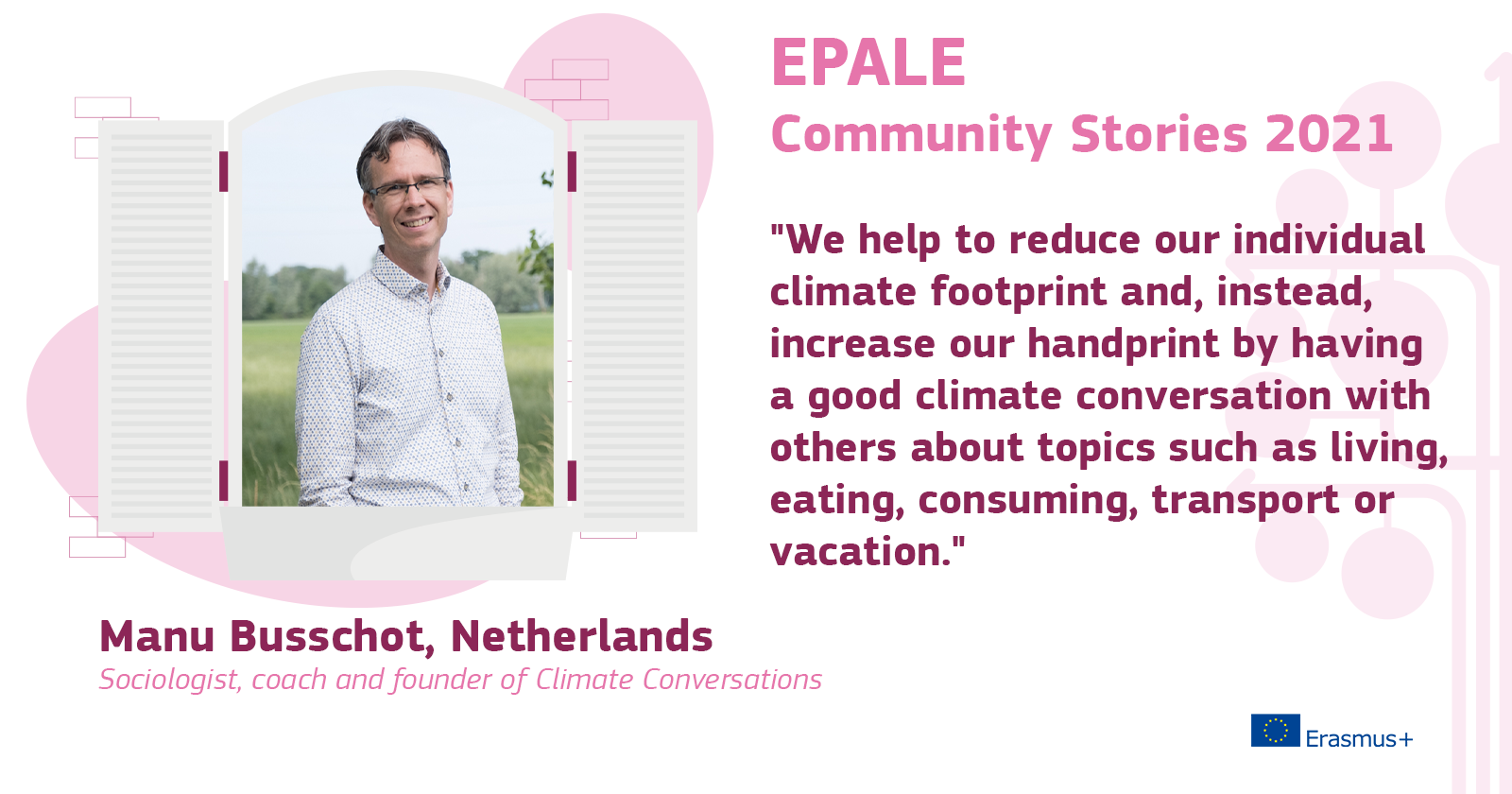Manu Busschots: climate conversations

Short bio
Climate Conversations offers accessible (online) workshops, training courses and masterclasses that help to reduce our individual climate footprint and, instead, increase our handprint by having a good climate conversation with others about topics such as living, eating, consuming, transport or vacation. The foundation wants to make climate-friendly choices a matter of course. It uses insights from climate psychology to offer people hope, humour and perspective for action.
My EPALE
This is my first experience with EPALE. I am curious about the reactions that our approach will elicit.
My Story
Does the topic of the 'climate' ever come up in your work, either indirectly or directly? If so, you will probably notice that this is not always easy. The subject evokes many strong opinions and emotions. Maybe you want to be a bit more confident and respond in a pleasant way. Not pointing fingers, but being more personal and practical. In the Climate Conversations workshops you learn how to do this effectively. In six two-hour meetings, you and others explore what you can do to make your life more climate-friendly, in a way that suits your own situation and goals.
I introduced the workshops in the Netherlands in 2016. These workshops were already very successful in England as Carbon Conversations. The materials and working methods were adapted to the Dutch context and are varied and playful. Interest in the workshops is steadily growing in the Netherlands. Broadly speaking, there are two main groups of participants: the frontrunners/pioneers who have been involved with the climate for years and who like to meet others to exchange experiences, and also a group of people who want to familiarise themselves with what they can do to live in a more climate-friendly way. They find Climate Conversations through the website, social media and, above all, through word-of-mouth from former participants. The participants are aged between 25 and 65 years old.
Climate Conversations hopes that the workshops will give the participants ideas to reduce their footprint and increase their handprint. The 'footprint' involves living in a more climate-friendly way yourself. The 'handprint' means involving others in your personal actions. The participants will receive a reading book with information about climate change and the impact of lifestyle choices, plus a workbook with exercises and checklists, to inspire them to take steps themselves. The aim is to make climate-friendly choices the new normal together.
The workshops provide tools for a good conversation. The Climate Conversations are not depressive conversations with lists of prohibitions and commandments. The courses are run in small groups with a maximum of eight participants. They put the participants on the right track to carpool, eat more plant-based food or buy solar panels. Afterwards, the participants are more confident and can discuss climate topics with respect for other subjects. If participants then want to take further steps, they can become a Climate Coach by following a three-day training course. This training clarifies how behavioural change around the climate is brought about or hindered (climate psychology). The participants learn how to work with the materials as a volunteer and how to guide a group. After the training you can run the workshops yourself in your own neighbourhood, school, company or library. This leads to an effective multiplication effect!
There are now climate coaches in more than seventy municipalities in the Netherlands. It is also possible to organise the workshops for organisations or on behalf of municipalities. In order to be able to do this properly, Climate Conversations offers an additional process.
Covid 19 has thrown a spanner in the works for the past two years. The usual workshops and training courses were mostly cancelled, but Climate Talks soon offered a number of activities online, such as a free e-courses with climate talks and an online inspiration session. These quasi-forced online activities are partly here to stay, even in post-Covid times. After all, it is easier to reach a more varied group of interested parties by working online.





Permaculture and Sustainable Agricultural systems
This event is of special interest to those of you concerned with sustainability issues: https://epale.ec.europa.eu/en/content/permamodule-conference-2022